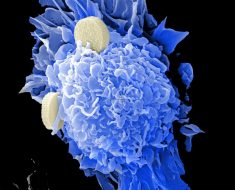
A Michigan man’s life was tragically cut short last month after he contracted a rare virus from a mosquito that ultimately left him brain dead within nine days.
Gregg McChesney of Kalamazoo County died in August following his nine-day battle with an aggressive illness, his obituary states.
Though it was unclear at the time of his death, doctors confirmed several days later that Gregg, 64, was infected with Eastern Equine Encephalitis (EEE), WOOD-TV reports.
The incredibly rare, potentially deadly, mosquito-borne virus, which causes brain infections and neurological problems, has killed three people in southwest Michigan this year, according to the outlet.
Gregg’s family referred to the tragedy as “unexpected,” especially because of how healthy and happy they say the 64-year-old man was before suddenly falling ill.
“He was perfectly healthy, happy human being and within a matter of nine days he went from perfectly healthy to brain dead,” his younger brother Mark McChesney told WOOD-TV. “All of a sudden he had a seizure and next thing you know, he’s in the ER and he just never came out of it.”
“Right off the bat, we were like, ‘How could this happen? What did happen?'” Mark added. “We just didn’t know, and the doctors were just doing everything they could to try to say it was this or that, and they just couldn’t figure it out.”

RELATED: A Third Person Has Died from a Rare Mosquito-Borne Illness in the United States
A former 33-year employee of Western Michigan University, Gregg dedicated his life to art and often painted in his studio, displayed his work at shows, and participated in local art exhibits and events, according to his obituary.
The Michigan native also enjoyed backpacking, fishing and camping — something his brother looked back on with fond memories.
“We had an intrusion of bears come to our campground and his reaction, he was just as mean and nasty as the bears,” Mark recalled to WOOD-TV of a previous camping trip to the Porcupine Mountains in the Upper Peninsula of Michigan. “So the bears went up the trees. They were like, ‘Who is this guy?'”
“He was a great guy. He loved life,” Mark added to the local outlet. “I don’t think he would have any regrets. I don’t think so because he found himself.”
His loved ones echoed similar sentiments on his obituary website, describing Gregg as “enthusiastic and a pleasure to get to know.”
“I have fond childhood memories of going to the farm each summer and the McChesney family coming to Indiana during the holidays,” his cousin wrote. “While you are no longer with us on earth, your legacy will live forever. I know you are in God’s hands and looking over us all. Rest in Peace my dear cousin Gregg. We will miss you. Until we meet again…”
“You will be missed. I enjoyed talking with you about your artwork & sharing our common interest in Art,” added another friend who knew him. “Such a shock hearing of your passing. May you Rest In Peace”
From 2009 to 2018, there have been seven reported cases of EEE in Michigan, according to the Center for Disease Control and Prevention. However, that number has doubled in the last year, making it the state’s worst outbreak since 2002, state health officials told WOOD-TV.
The CDC says that people over 50 and under 15 years old are more susceptible to the illness, which starts to show symptoms four to 10 days after infection.
Those infected will develop chills, fever, lethargy and joint pain. In cases where the disease enters the central nervous system, one-third of patients die from EEE, and those who survive are likely to be mentally and physically disabled.
Due to the severity of the virus and because there is no vaccine, Kalamazoo County Health & Community Services are reminding locals to protect themselves against mosquitos and EEE, WOOD-TV reports.
In order to do this, people are encouraged to wear long-sleeved shirts and pants while outdoors, secure screens on windows, empty any standing water near your home and use insect repellent containing DEET, picaridin, IR3535 or oil of lemon eucalyptus, the CDC states.
Source: Read Full Article





